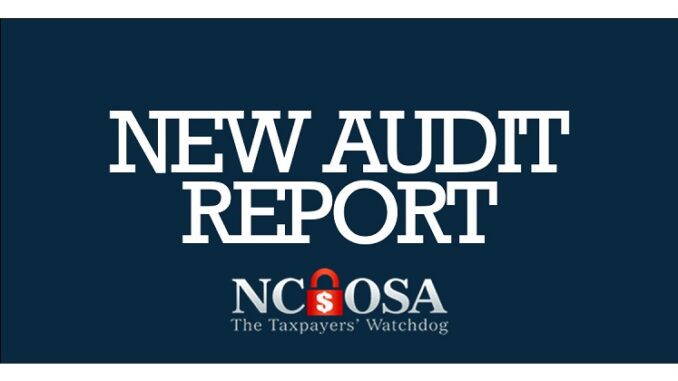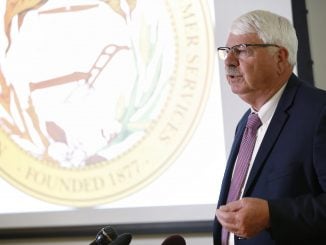
RALEIGH — The North Carolina State Auditor’s Office has issued a report detailing “inadequate monitoring” of various funds, including that of COVID-19 relief money as well as Medicaid and student financial aid funding.
The Statewide Single Audit (SSA) is conducted annually and uses “a prescribed, risk-based approach to select certain programs to be audited,” and the results are submitted to the Federal Audit Clearinghouse, per a press statement by the auditor’s office.
The 271-page audit is for the Fiscal Year ending June 30, 2022, and reflects federal awards of $38.2 billion.
“This report includes significant deficiencies and material weaknesses in internal control relating to major federal programs and instances of noncompliance, including several that we believe constitute material noncompliance, that meet the criteria of the Uniform Guidance,” the SSA states.
The press statement cites “Noteworthy findings and recommendations” such as the inadequate monitoring of Coronavirus Relief Funds by the North Carolina Pandemic Recovery Office known as NCPRO.
The report also lists errors in Emergency Rental Assistance program spending by the state’s Department of Public Safety (DPS) and not enough monitoring of the Education Stabilization Fund – Elementary and Secondary School Emergency Relief program by the N.C. Department of Public Instruction (NCDPI)
The SSA found errors in the Medicaid billing and payment process as well as “deficiencies” in the Medicaid Eligibility Determination Process by the N.C. Department of Health and Human Services (NCDHHS)
Total questioned costs for state agencies in the SSA are listed at $1,049,409 including $544,574 for NCDHHS, $486,807 for DPS, and $18,028 for the N.C. Department of Commerce.
DPS’ questioned costs were linked to overpayments of rent and utility assistance from the Emergency Rental Assistance program. That program was part of the N.C. Housing Opportunities and Prevention of Evictions (HOPE), managed by the N.C. Office of Recovery and Resiliency, a division of DPS.
The HOPE program assisted families with incomes of up to 80% or less of the average median income in a given area who were facing financial issues or job losses due to the pandemic.
According to the SSA, the rental assistance program also doled out funds beyond the 15-month window, citing that out of the 114,000 households identified by auditors, 31,764 households received assistance outside of the prescribed time frame limit.
Of that 31,764, “auditors tested 151 households that received $1.8 million in financial assistance” and found “84 (56%) households received one to 15 more months of financial assistance than allowed, resulting in overpayments totaling $433,262.”
The remaining questioned costs for DPS involved rent and utility overpayments totaling over $53,000. According to the SSA, “Certain aspects of aspects of this finding were previously reported in the 2021 Statewide Single Audit…”
NCDHHS had more reporting and deficiency issues than the other departments.
Per the audit, NCDHHS incorrectly used $127,676 of Immunization Cooperative Agreements program funds, did not report complete and accurate sub-award information for some sub-recipients of the grants to the Federal Funding Accountability and Transparency Act (FFATA) Subaward Reporting System (FSRS).
Auditors found deficiencies in NCDHHS’ TANF Eligibility Determination Process and in the sampling of cases found payments made to ineligible families. Additionally, NCDHHS was found to have submitted inaccurate TANF data to the federal government.
FFATA reporting for the Social Services Block Grant (SSBG) was also an issue. Auditors reviewed all 240 sub-awards totaling $55.7 million and found that none were reported as required. Monitoring of SSBG sub-recipients was also lacking or incomplete for 25% of the sub-recipients sampled.
The biggest issues for NCDHHS involved Medicaid overpayments and payments to providers based on inaccurate and inadequately documented eligibility determinations.
Approximately 2.2 million beneficiaries received $17.6 billion in Medicaid benefits during the audit period according to the SSA report.
During the same period, NCDHHS processed over 24 million “original fee-for-service claims” representing $8.1 billion in payments. Auditors tested a sample of 15,147 of those claims worth $19.0 million in payments and found 14 (9.3%) contained errors.
But there were more problems with the samples including missing documentation and claims that did not match or support the services being billed by a provider. The sample problems revealed a serious and potentially costly overpayment issue.
“Even though the tests identified only $13,302 in overpayments (federal share $9,836), if tests were extended to the entire population, questioned costs could be greater than $25,000,49 and the Department may be required to pay the funds back to the federal government,” the SSA report states.
As with other findings in the 2023 SSA, the Medicaid payment issue was also reported in the 2021 Statewide Single Audit.
Other NCDHHS issues included:
- Failure to allocate and use $84,279 of Substance Abuse Block Grant (SABG) funds for primary prevention programs as required.
- Incorrectly using $317,153 of SABG funds from an award that ended.
- Not reporting complete and accurate sub-award information for some sub-recipients of the SABG funds to the FFATA Subaward Reporting System errors, including 14 sub-awards totaling $47.3 million that were not reported at all.
- Not adequately monitoring $47 million in federal funds passed to sub-recipients for providing treatment and prevention services for substance abuse.
The SSA report says the Department of Commerce “incorrectly used $18,028 of Unemployment Insurance (UI) administration award funds.” The auditors tested only a small sample of the $116.8 million used to administer the UI program.
“The North Carolina Pandemic Recovery Office (NCPRO), a division of the Office of State Budget and Management, did not adequately monitor $159.9 million in federal funds used for expenditures incurred due to the COVID-19 pandemic,” the SSA states. The auditors tested a sample of 40 direct expenditures and “found no evidence of review of supporting documentation.” The SSA also notes that the same finding was previously reported in the 2021 Statewide Single Audit.
As far as student loans and financial assistance, the SSA found several cases where colleges included in the report did not accurately report enrollment status changes of those applying for financial aid to the National Student Loan Data System (NSLDS).
In K-12, the SSA found that the N.C. Department of Public Instruction (NCDPI) had errors related to “complete, accurate, and timely FFATA reporting. That reporting covers the Education Stabilization Fund – Elementary and Secondary School Emergency Relief (ESSER) and Supporting Effective Instruction (SEI) programs.”
Of the 298 SEI sub-awards totaling $60.9 million that was required to be reported to the FFATA, auditors found that “none were reported as required.” For the 1,176 ESSER sub-awards totaling $3.3 billion, the SSA says the Department stopped FFATA reporting on ESSER in December 2021 and that “As a result, 1,291 sub-awards totaling $230.1 million made during 2022 were not reported.”
The SSA also says that NCDPI didn’t complete monitoring for 329 public school units that received $1.77 billion in federal funding from three programs during the audit period.


